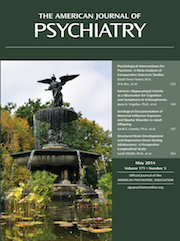Genetic Counseling for Common Psychiatric Disorders: An Opportunity for Interdisciplinary Collaboration
To the Editor: In their timely review of recent important genetic findings in psychiatric disorders—specifically, common and rare copy number variants (CNVs) in bipolar disorder, schizophrenia, and autism spectrum disorders—Gershon and Alliey-Rodriguez (1) propose that these findings “must lead to profound changes” in genetic counseling and “propose that genetic counseling is more than risk prediction.”
The genetic counseling profession has devoted considerable attention to the process of risk communication (2) and the conceptualization of risk as a complex construct that comprises more than probability alone—for instance, by addressing how a client’s context and subjective perception of the severity of a potential outcome influences perceptions of risk (3). Within this framework, the identification of copy number variants that play important roles in the etiology of psychiatric disorders represents a refinement in our ability to predict probabilities of illness, rather than a major paradigm shift in the risk communication process.
Similarly, psychological and psychotherapeutic dimensions to genetic counseling, such as attending to experiences of stigma, shame, and guilt, have been explored in the genetic counseling literature for several decades (4). We fully agree with the authors that a psychotherapeutic approach would best serve patients and families seeking psychiatric genetic counseling for high-impact detectable genetic events such as copy number variants, and we would add that such an approach ought to inform all genetic counseling encounters. This is consistent with a growing body of evidence from studies of genetic counseling practice indicating that attending to psychological dimensions of practice, such as the facilitation of understanding, empathic responses, and lower levels of verbal dominance, are associated with more positive outcomes (5).
We agree with the authors that there is a need for expert counseling for families affected by psychiatric disorders. We propose that there is much to be gained by greater collaboration between the psychiatric genetics community and the genetic counseling profession, in particular with regard to exploring how best to implement testing for copy number variants in psychiatric populations in clinical practice, and how to manage the attendant ethical challenges.
1 : New ethical issues for genetic counseling in common mental disorders. Am J Psychiatry 2013; 170:968–976Link, Google Scholar
2 : Descriptive and numeric estimation of risk for psychotic disorders among affected individuals and relatives: implications for clinical practice. Psychiatry Res 2012; 196:52–56Crossref, Medline, Google Scholar
3 : Toward a new conceptualization and operationalization of risk perception within the genetic counseling domain. J Genet Couns 1993; 2:275–294Crossref, Medline, Google Scholar
4 : Psychological aspects of genetic counseling, III: management of guilt and shame. Am J Med Genet 1984; 17:673–697Crossref, Medline, Google Scholar
5 : Assessment of the content and process of genetic counseling: a critical review of empirical studies. J Genet Couns 2008; 17:434–451Crossref, Medline, Google Scholar



